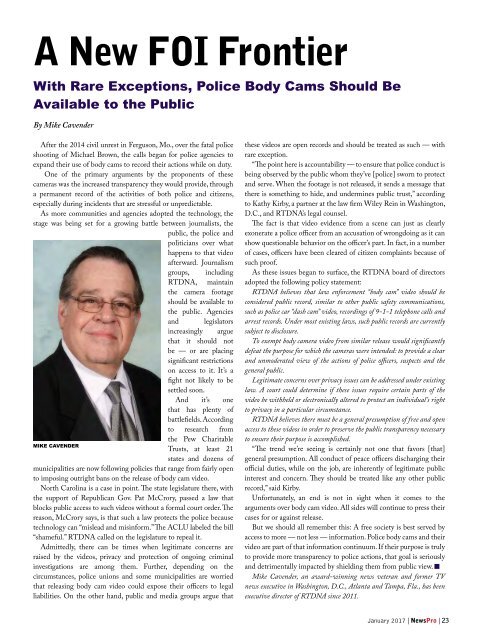12 to Watch
2jsKIWf
2jsKIWf
Create successful ePaper yourself
Turn your PDF publications into a flip-book with our unique Google optimized e-Paper software.
A New FOI Frontier<br />
With Rare Exceptions, Police Body Cams Should Be<br />
Available <strong>to</strong> the Public<br />
By Mike Cavender<br />
After the 2014 civil unrest in Ferguson, Mo., over the fatal police<br />
shooting of Michael Brown, the calls began for police agencies <strong>to</strong><br />
expand their use of body cams <strong>to</strong> record their actions while on duty.<br />
One of the primary arguments by the proponents of these<br />
cameras was the increased transparency they would provide, through<br />
a permanent record of the activities of both police and citizens,<br />
especially during incidents that are stressful or unpredictable.<br />
As more communities and agencies adopted the technology, the<br />
stage was being set for a growing battle between journalists, the<br />
public, the police and<br />
politicians over what<br />
happens <strong>to</strong> that video<br />
afterward. Journalism<br />
groups, including<br />
RTDNA, maintain<br />
the camera footage<br />
should be available <strong>to</strong><br />
the public. Agencies<br />
and legisla<strong>to</strong>rs<br />
increasingly argue<br />
that it should not<br />
be — or are placing<br />
significant restrictions<br />
on access <strong>to</strong> it. It’s a<br />
fight not likely <strong>to</strong> be<br />
settled soon.<br />
And it’s one<br />
that has plenty of<br />
battlefields. According<br />
<strong>to</strong> research from<br />
the Pew Charitable<br />
Mike Cavender<br />
Trusts, at least 21<br />
states and dozens of<br />
municipalities are now following policies that range from fairly open<br />
<strong>to</strong> imposing outright bans on the release of body cam video.<br />
North Carolina is a case in point. The state legislature there, with<br />
the support of Republican Gov. Pat McCrory, passed a law that<br />
blocks public access <strong>to</strong> such videos without a formal court order. The<br />
reason, McCrory says, is that such a law protects the police because<br />
technology can “mislead and misinform.” The ACLU labeled the bill<br />
“shameful.” RTDNA called on the legislature <strong>to</strong> repeal it.<br />
Admittedly, there can be times when legitimate concerns are<br />
raised by the videos, privacy and protection of ongoing criminal<br />
investigations are among them. Further, depending on the<br />
circumstances, police unions and some municipalities are worried<br />
that releasing body cam video could expose their officers <strong>to</strong> legal<br />
liabilities. On the other hand, public and media groups argue that<br />
these videos are open records and should be treated as such — with<br />
rare exception.<br />
“The point here is accountability — <strong>to</strong> ensure that police conduct is<br />
being observed by the public whom they’ve [police] sworn <strong>to</strong> protect<br />
and serve. When the footage is not released, it sends a message that<br />
there is something <strong>to</strong> hide, and undermines public trust,” according<br />
<strong>to</strong> Kathy Kirby, a partner at the law firm Wiley Rein in Washing<strong>to</strong>n,<br />
D.C., and RTDNA’s legal counsel.<br />
The fact is that video evidence from a scene can just as clearly<br />
exonerate a police officer from an accusation of wrongdoing as it can<br />
show questionable behavior on the officer’s part. In fact, in a number<br />
of cases, officers have been cleared of citizen complaints because of<br />
such proof.<br />
As these issues began <strong>to</strong> surface, the RTDNA board of direc<strong>to</strong>rs<br />
adopted the following policy statement:<br />
RTDNA believes that law enforcement “body cam” video should be<br />
considered public record, similar <strong>to</strong> other public safety communications,<br />
such as police car “dash cam” video, recordings of 9-1-1 telephone calls and<br />
arrest records. Under most existing laws, such public records are currently<br />
subject <strong>to</strong> disclosure.<br />
To exempt body camera video from similar release would significantly<br />
defeat the purpose for which the cameras were intended: <strong>to</strong> provide a clear<br />
and unmoderated view of the actions of police officers, suspects and the<br />
general public.<br />
Legitimate concerns over privacy issues can be addressed under existing<br />
law. A court could determine if these issues require certain parts of the<br />
video be withheld or electronically altered <strong>to</strong> protect an individual’s right<br />
<strong>to</strong> privacy in a particular circumstance.<br />
RTDNA believes there must be a general presumption of free and open<br />
access <strong>to</strong> these videos in order <strong>to</strong> preserve the public transparency necessary<br />
<strong>to</strong> ensure their purpose is accomplished.<br />
“The trend we’re seeing is certainly not one that favors [that]<br />
general presumption. All conduct of peace officers discharging their<br />
official duties, while on the job, are inherently of legitimate public<br />
interest and concern. They should be treated like any other public<br />
record,” said Kirby.<br />
Unfortunately, an end is not in sight when it comes <strong>to</strong> the<br />
arguments over body cam video. All sides will continue <strong>to</strong> press their<br />
cases for or against release.<br />
But we should all remember this: A free society is best served by<br />
access <strong>to</strong> more — not less — information. Police body cams and their<br />
video are part of that information continuum. If their purpose is truly<br />
<strong>to</strong> provide more transparency <strong>to</strong> police actions, that goal is seriously<br />
and detrimentally impacted by shielding them from public view.<br />
Mike Cavender, an award-winning news veteran and former TV<br />
news executive in Washing<strong>to</strong>n, D.C., Atlanta and Tampa, Fla., has been<br />
executive direc<strong>to</strong>r of RTDNA since 2011.<br />
January 2017 | NewsPro | 23


